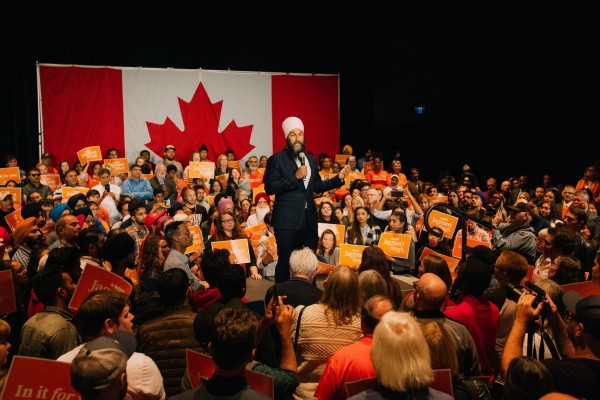Second NDP leadership debate: With youth issues as backdrop, differences start to emerge

Photo courtesy of the NDP
This past Sunday in Montreal, the Federal NDP held its second leadership debate, with the same cast that was in Ottawa two weeks ago. While that debate served to introduce Canadians to the contenders, the general questions meant that the whole event was an ‘I agree, and’ fest.
This time around, the focus on youth issues showcased greater specificity, and thus brought out both different positions, along with divergent means to reach similar ends. The politics of pineapple pizza aside (this author supports it), even the ‘lightning round’ questions were more substantive this time. All of this means that an undecided NDP member was given some guidance about who they may support.
Guy Caron
Caron took a similar approach as he did in Ottawa; he’s the loyal Quebec candidate, brought into politics by his disillusionment with the Liberals in the 1990s, and committed to the NDP well before the orange wave. Additionally, Caron is trying to be the ‘policy wonk’ of the bunch, with his reserved tone, economic credentials, and assertion that while he and his competitors largely agree on the ‘why,’ he is searching for a practical ‘how.’
In many ways, Caron succeeded in this effort. He stayed on his messaging, centred his professional and Quebec experience, and spoke in favour of realism in how the party approaches political and social issues. He was able to speak with the credentials of an expert, but not appear to be out-of-touch.
The double-edged sword for Caron revolves around his Basic Income Guarantee (BI). The policy has real cross-party appeal, and it might help the NDP capture a wide swath of voters. Nevertheless, Caron at times painted the BI as a sort of general panacea to numerous social and economic issues.
In some ways, this was effectively articulated, as when Caron noted that a BI could fund a student’s living expenses (the others focused more directly on the formal costs of tuition). But his focus on a BI as the main solution for housing left me wanting, because in many cities, housing is not simply a cost issue, but revolves around zoning, a lack of rent controls, and a dearth of social housing, none of which a BI solves. At other times, this focus made Caron’s additional policies seem rushed, such as when he briefly touted a crown corporation for electric cars. My interest here was piqued, but we got no details.
Charlie Angus
If Angus’ goal is to be the folksy progressive, he turned it up a couple notches in Montreal. On everything from how he talks, to how he weaves in personal anecdotes, Angus gave a likeable and relatable performance. Out of this came some strong one-liners and poignant imagery, with his juxtaposition of the Trudeau government defending wealthy tax privileges whilst fighting indigenous Canadians in court over educational equality.
Angus also emphasized the reality of a broad working-class constituency in Canada that is being underserved by the current parties, including the NDP. I think working-class unity in Canada (urban and rural, blue collar and white collar, as Angus put it) is essential to peel away the Trudeau progressive bloc and counteract the rise of Trumpian conservatism. Also fascinating was Angus’ excellent point on how the federal government could influence labour practices beyond direct federal jurisdiction by using tax provisions and contracts to compel employers to pay better wages and eschew unpaid work.
But Angus’ folksiness can hurt him, especially when it obscures policy specifics. He came off poorly when dodging a question around electoral reform by saying that the NDP needs to win power first, and then debate the issue. Frankly, the issue of electoral reform is too important for the broad NDP-Liberal-Green constituency, and those voters are going to want specificity on this front, especially given Trudeau’s broken promise. Still, many will argue that Angus gave the strongest overall performance of the night (at least in English), and I don’t think that is an unreasonable claim.
Peter Julian
While many felt Julian would play the role of an ‘establishment’ candidate, he is clearly making a strong push to corner the NDP’s environmentalist wing, painting how a green economy is a fundamental act of social and intergenerational justice, and how he would make a clear commitment to stop any further pipeline construction.
Further, Julian has tapped into a populist and grassroots vein to counterbalance his fairly conventional image. Time and time again, Julian argued that the party needed ‘hundreds of leaders’ across the country, based in social movements in tune with young Canadians. These leaders are, for Julian, fundamental to building up the NDP as a credible progressive movement. He underlined his shared experience with these leaders, touting that he’s been an NDPer since 14.
Finally, Julian brought some policy specificity to the game, speaking about the value of specific deficit types more than taking a yes-or-no stance on the matter. He referenced other countries in their ability to make for a ‘smarter’ energy grid, as well as alluding to some potential ideas like Bill Gates’ suggestion of a ‘robot tax’ as a tool to deal with automation’s adverse side effects (though this democratic socialist perhaps feels that we need to talk about ownership more than taxation when it comes to large-scale automation and the effects it may have on exacerbated inequality).
All in All, Julian gave a steady performance, and has managed to move leftward, but still keep the conventional image that will be key in winning over NDPers looking for a person they feel ticks the right boxes for voters outside the party’s labour-activist-academic nexus.
Niki Ashton
This debate was most important for Ashton, largely because she is the only millennial in the race, and because youth issues have been central to her political activism.
There were times where her statements needed less flourish and more substance. And she was perhaps the weakest at answering the shorter questions, indicating that she needs to work on her pointedness. Nevertheless, Ashton gave the performance she set out to make, making herself out be the definitive candidate of the party’s left. She decried the party for ‘turfing’ candidates with pro-Palestinian positions, and called out the systemic inequality of our ‘rigged’ system, where social injustice isn’t so much an accident as it is a series of political priorities.
Ashton was at her strongest when speaking about social movements. She has strong ties to many of them, and has real credibility when putting forth a set of youth initiatives that are intersectional in nature. In her cross-country tour on youth precarity, she spoke about the broader issues that affect all young workers, but was always sure to include a diversity of viewpoints to highlight that one-size-fits-all policies rarely serve the needs of a diverse populace.
In short, Ashton was largely on point in this debate, drawing upon the work she’s done over the recent months. Ashton is doing well at portraying a modern image of the NDP, all while staying connected to long-held democratic socialist principles around public control of key industries. If she can bring together the traditional NDP, and link it with these 21st century social movements, she can built a formidable movement both inside and outside of Parliament.
One challenge for Ashton is that, by making herself out to be the leftist of the field, she has to clearly describe her vision for a new socio-economic order, because Canadians might well need to be educated on this process. This might be a heavy undertaking, but there real opportunities to build towards a new Canada if she puts forward a concrete vision in this regard, and real downfalls if she lets her opponents define this image for her.
In the end, all four candidates gave a satisfactory effort. There could have been a few more points for specific policy debates, and I would have loved to see questions that forced contestants to balance the NDP’s divergent ideological and demographic forces. One question we should have seen was on two-tier collective bargaining, where many unions have been willing to accept deals that offer unequal pay for equal work to new hires. It’s a talk we need to have, and it’s an issue we need to address to ensure that unionization is actually seen as a viable path towards a better society for young Canadians, and not just an insurance policy for older workers.
Nevertheless, I am confident in saying—with more certainty than in 2011—that any of these four people could well lead a strong and unified parliamentary contingent towards 2019, and can look forward to a united caucus behind them. And while we may well still see people like Pat Strogan, Sid Ryan, and Jagmeet Singh enter the contest, the strong performance from the current four should lead them to hasten their decision, lest people become dedicated to the choices already on tap.
Christo Aivalis, a member of the CD web committee, is an adjunct professor of history at Queen’s University. His dissertation examined Pierre Trudeau’s relationship with organized labour and the CCF-NDP, and has been accepted for publication with UBC Press. His work has appeared in the Canadian Historical Review, Labour/le Travail, Our Times Magazine, Ricochet and Rankandfile.ca. He has also served as a contributor to the Canadian Press, Toronto Star, CTV and CBC. His current project is a biography of Canadian labour leader A.R. Mosher.










